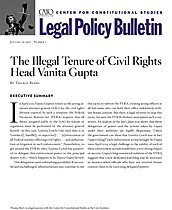In April 2015 Vanita Gupta’s tenure as the acting assistant attorney general (AAG) for the civil rights division expired. In such a situation, the Federal Vacancies Reform Act (FVRA) requires that all duties assigned solely to the AAG by statute or regulation must be performed by the attorney general herself—in this case, Loretta Lynch. One such duty is to “conduct[], handle[], or supervise[] … [e]nforcement of all Federal statutes affecting civil rights … and authorization of litigation in such enforcement.” Nonetheless, to get around the FVRA’s rules, Loretta Lynch has purported to delegate this enforcement power to the principal deputy AAG—which happens to be Vanita Gupta herself.
This delegation raises a disturbing possibility. If successful and unchallenged, administrations may continue to use this tactic to subvert the FVRA, creating acting officers in all but name who can hold their office indefinitely without Senate consent. But there is legal recourse to stop this tactic, because the FVRA’s drafters anticipated such a maneuver. An analysis of the law’s plain text shows that these delegations of power—and the actions taken by Gupta under their authority—are legally illegitimate. Unless the government can show that Loretta Lynch was in fact “supervis[ing]” each enforcement action brought by Gupta since April 2015, a legal challenge to the validity of each of these enforcement actions would have a very strong chance of success. Gupta’s long-unnoticed violation of the FVRA suggests that a new dedicated watchdog may be necessary to monitor when officials who have not received Senate consent claim to be exercising delegated powers.

This work is licensed under a Creative Commons Attribution-NonCommercial-ShareAlike 4.0 International License.

